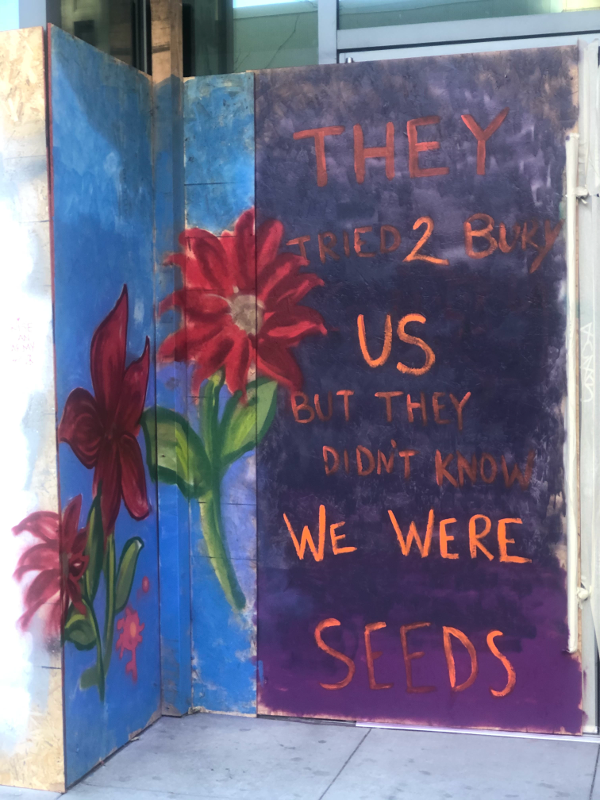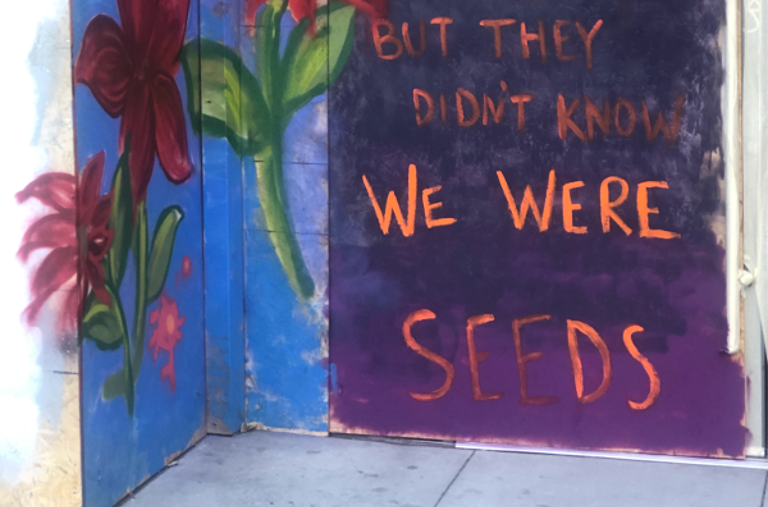Introduction
This is a talk I gave at the Seventh South-South Forum on Sustainability: Climate Change, Global Crises, and Community Regeneration on July 12, 2020 in a panel titled “Ecological Justice and Social Transformation.” The Forum was organized by Dr. Kin Chi Lau of the Global University for Sustainability.
It is a distinct privilege, and I used the word consciously, to be here with you all.
I want to start by thanking Kin Chi for her support and encouragement of the Global University for Sustainability over many years, and needless to say, I am delighted to be part of this session and the conference of which it is part.
Indeed, this is not a conference, in the usual awful sense, but explicitly a forum, and we are invited to speak from the heart, to engage fully, to listen well, and to build bridges.
This delights me!
I would like to read the statement from the organizers which attracted me to this forum:
The South-South Forum on Sustainability hopes to bring together old and new generations of committed people working for ecological and socio-economic justice to articulate knowledge produced by experiences on the field, common reflections, and new findings about the critical reality, in particular, from communities that defend their commons. It hopes to help cross-fertilize initiatives practiced by organizations and networks, to foster further inter-connections. It hopes to experiment with creative and self-reliant forms of interacting, networking and managing resources.
From that starting point, I would like to add a few thoughts for our conversations by speaking to three of the discussion questions that have been suggested for speakers on these two sessions on Ecological Justice and Social Transformation:
How do you see the most acute crises and burning issues of today as related to climate change and human-induced disasters, in your region/country/community?
A sober look at the root causes of the present crisis points unambiguously to the normal workings of capitalism as an economic system and a way of life as perhaps the prime reason for the interconnected ills that beset us. Underlying this, we find the patriarchal and racial hierarchies that capitalism’s elites thrive on, the history of their colonial plunder and the dysfunctional operation of neoliberal globalization, and the militarism, violence, and lack of participation that permeate and poison our cultures. On top of it all, the climate crisis, made by the endless search for profit over people, the planet, and life itself, now condemns us to a future of extreme weather in ecosystems that will not recover for an eternity of generations to come. To be clear, it’s the interconnected nature of the economic, political, and cultural crises of our times with the climate crisis that is at the root of our predicament in this century.
And now we have the wake-up moment of the coronavirus breaking upon these structural, systemic burdens.
Suddenly, it seems like we might have a quintuple crisis on our hands!
1) the inequality that neoliberal capitalist globalization produces,
2) the democracy deficit caused by people’s lack of faith everywhere in existing political parties,
3) the culture of violence and militarism,
4) the climate emergency, and
5) the corona crisis.
The Floyd Rebellion around racism and the evils that come from it in the US, my country, is significant enough already to speak of a sextuple crisis.
How might we analyze climate justice issues as connected to financial capitalism, globalization, colonization, modernization, and so forth?
Well, how do we connect this many dots?
That’s an open question for me. I believe that working on intersecting crises, on so-called wicked problems, is the order of the day, and as in most things, the very interlocking of our crises gives me hope for confronting them with courage and vision.
Meanwhile, our time in history, at the beginning of what we might call “the decade of decision” drives home the point that the levels of inequality in my own society, and around the world, are not only intolerable for vast numbers of people – real, actually existing people like you and me – but also should be unacceptable to all human beings with a conscience and eyes to see.
But all of this appears to be largely invisible to the holders of economic and political power in my country – and this may be because they in fact bear responsibility for it. There is no reason to expect this elite of the one percent – whether in the United States, Russia, China, Brazil, the United Kingdom, or India – all of which are ruled by racist, patriarchal demagogues – to do anything about it. They have no plan worthy of the name, even if they did want to do something. Their hands are tied by the systems of neo-liberal, capitalist globalization, which has no solution to economic inequality and decent, democratic political decision-making.
That much is clear.
How could we re-define and substantiate the concept of “social transformation” or “alternatives”? What are some propositions for alternative theories, praxis, policies?
My life comes down to doing what I can to be with others and to confront the climate crisis…
I know of two ways to do so – through the global network of climate justice movements and through the actual construction of systemic alternatives.
We need to do both, and I would like to share a story about our efforts to set out on the path of a systemic alternative here in Santa Barbara.
In the little town of Isla Vista, adjacent to the university where I teach, community interest in carbon-neutrality, just transition, critical ecological post-sustainability, and systems change from below has grown deep roots.
We aim to encourage and inspire the foundation of an eco-village with renewable energy, a flourishing and regenerative agro-ecology of public urban gardens, cooperative, affordable eco-housing, a circular eco-economy based on solidarity and capable of meeting the real needs of the inhabitants, and radical self-governance and community priorities determined by everyone who resides here, all within a vibrant web of imagination and cultural creativity.
Conceptually our efforts draw on the latest thinking about Transition Towns, degrowth, buen vivir, just transition, radical climate justice, ubuntu, intersectional ecosocialism, and the many worlds to be found in the path-breaking book Pluriverse: A Post-Development Dictionary, edited by Alberto Acosta, Federico Demaria, Arturo Escobar, Ashish Kothari, and Ariel Salleh. Another approach that guides our thinking and practice is adrienne maree brown’s Emergent Strategy, which counsels working from the bottom up in an inclusive and un-predetermined way to generate a collective analysis enabling members to articulate their desires and dreams for what could be.
We know that to achieve this aspirational aim will require significant political organization, social movement building, and visionary policy proposals, including the design of strategies for achieving a systemic alternative and perhaps even the invention of a new kind of party!
What does this mean?
On a cosmic scale, my best idea is that we try to leverage the strength and power and beauty of our many movements and ideas into a new kind of entity – a completely new kind of party – that can take political power away from those who use it to abuse us, in place after place. In time, these experiments with the unknown would be able to support each other and link themselves together to find and co-create the pathways to the future we want. These new entities that come out of our movements must be made to live up to their promise and to enact our dreams by us, their only possible guarantors.
Such new parties, if they emerge, and the broader, diverse social movements that must drive and hold them accountable, will need to link arms firmly with existing transition initiatives and the many more projects of creation that will need to be built everywhere to join those which are already actually in existence. And they must synergistically support each other’s efforts to fashion the collective power we need for global governance. Then we would see a people’s COP [at the UN climate negotiations, which are currently a joke] to articulate a “FAB” (fair, ambitious, and binding) universal climate treaty. Then we would be able to tax and legislate the fossil fuel corporations out of business. Then we would be able to take on the legacy of inequality and genocide that the United States has been built on. Then…
Let us use this moment to patiently build our deepest networks for radical social transformation. The cruel urgency of the pandemic is nourishing them of necessity, just as Trump’s election in 2016 witnessed an astounding array of social movements spring to life.
This is a moment to gathering forces for many liberations and novel forms of revolution in defense of life and justice.
As the Zapatistas, those un-professionals of hope, often say, “We want a world where many worlds fit.” That world, containing somehow our many worlds, will be created and constructed by all of those who are willing to seek it, to do the hard work (which, let’s not forget, also brings so much joy and purpose), and to embrace hope, imagination, and heart, in equally abundant measure.
I offer these thoughts in the hope of generating further participation and passionate commitment among readers and the millions of ordinary people who must rise to our common occasion.
Because there are many lessons to learn, one for every day of the rest of our lives, and for that reason we should look at today, and tomorrow, and the day after as opportunities to learn, to grow, to find each other, and to make change.
Systemic change. System change, not climate change.
TIPA: there is a pluriverse of alternatives.
The path will be long, hard, dangerous, and difficult, friends, so this is a time for joyful, radical, action, for a joyful militancy.
Let’s get going!

Teaser photo credit: One of the murals painted in downtown Oakland after the murder of George Floyd. Photo by Kum-Kum Bhavnani.






